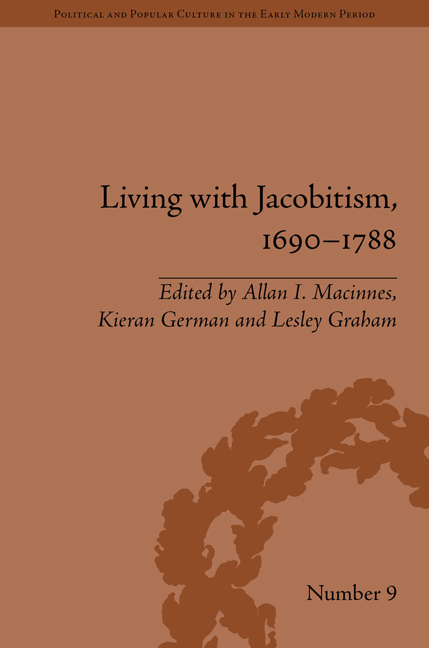Book contents
- Frontmatter
- CONTENTS
- List of Contributors
- List of Figures
- Abbreviations
- Preface: Breandán Ó Buachalla, A Tribute
- Introduction: Living with Jacobitism
- 1 The First Jacobite and the Scottish Parliament
- 2 The Scottish Jacobite Community at Saint-Germain after the Departure of the Stuart Court
- 3 Liturgy: The Sacramental Soul of Jacobitism
- 4 ‘Zealous in the Defence of the Protestant Religion and Liberty’: The Making of Whig Scotland, c. 1688–c. 1746
- 5 Jonathan Swift's Memoirs of a Jacobite
- 6 ‘Female Rebels’: The Female Figure in Anti-Jacobite Propaganda
- 7 Commerce and the Jacobite Court: Scottish Migrants in France,1688–1718
- 8 Ultramontane Ultras: The Intellectual Character of Irish Students at the University of Paris
- 9 To a Fair Meeting on the Green: The Order of Toboso and Jacobite Fraternalism, 1726–c. 1739
- 10 English and Scottish Jacobite Painters in Eighteenth-Century Rome
- 11 Polite War: Material Culture of the Jacobite Era, 1688–1760
- 12 Robert Adam: ‘My Mother's Dear British Boy’
- 13 From Jacobite to Jacobin: Robert Watson's Life in Opposition
- 14 Robert Louis Stevenson's ‘The Young Chevalier’: Unimagined Space
- Notes
- Index
5 - Jonathan Swift's Memoirs of a Jacobite
- Frontmatter
- CONTENTS
- List of Contributors
- List of Figures
- Abbreviations
- Preface: Breandán Ó Buachalla, A Tribute
- Introduction: Living with Jacobitism
- 1 The First Jacobite and the Scottish Parliament
- 2 The Scottish Jacobite Community at Saint-Germain after the Departure of the Stuart Court
- 3 Liturgy: The Sacramental Soul of Jacobitism
- 4 ‘Zealous in the Defence of the Protestant Religion and Liberty’: The Making of Whig Scotland, c. 1688–c. 1746
- 5 Jonathan Swift's Memoirs of a Jacobite
- 6 ‘Female Rebels’: The Female Figure in Anti-Jacobite Propaganda
- 7 Commerce and the Jacobite Court: Scottish Migrants in France,1688–1718
- 8 Ultramontane Ultras: The Intellectual Character of Irish Students at the University of Paris
- 9 To a Fair Meeting on the Green: The Order of Toboso and Jacobite Fraternalism, 1726–c. 1739
- 10 English and Scottish Jacobite Painters in Eighteenth-Century Rome
- 11 Polite War: Material Culture of the Jacobite Era, 1688–1760
- 12 Robert Adam: ‘My Mother's Dear British Boy’
- 13 From Jacobite to Jacobin: Robert Watson's Life in Opposition
- 14 Robert Louis Stevenson's ‘The Young Chevalier’: Unimagined Space
- Notes
- Index
Summary
The Irish-born satirist and pamphleteer Jonathan Swift, Church of Ireland Dean of St Patrick's Cathedral Dublin, was a juring High Churchman, yet he was involved in publishing the memoirs of an Irish Jacobite soldier in Scotland, a work which is in part a printed apologia for Episcopalian Jacobitism. The remarkable book was Memoirs of Capt. John Creichton. Written by Himself, an octavo volume of 170 pages, first published in 1731. It is an instance of Swift 's sympathy, indeed elective affinity with a Jacobite community of allegiance. This essay will consider aspects of the work and contend that Swift 's involvement with Creichton's memoirs was prompted by his High Church confessional politics which was the principal lens through which Swift viewed the Revolution in Scotland, Ireland and England. Swift had a three kingdoms perspective. He fully supported Anglican opposition in 1686–8 to James II's attempt to repeal the laws and Test Acts against Roman Catholics and Protestant nonconformists and to the King's exercise of the prerogative through Declarations of Indulgence. He wrote that the Revolution of 1688 was justified, but that in its consequences ‘the Prince of Orange's expedition … produced some very bad effects, which are likely to stick long enough by us’.
- Type
- Chapter
- Information
- Living with Jacobitism, 1690–1788The Three Kingdoms and Beyond, pp. 71 - 84Publisher: Pickering & ChattoFirst published in: 2014

